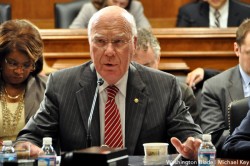National
BREAKING: Senate panel approves DOMA repeal legislation
Committee approves bill on 10-8 party-line vote

A Senate committee took historic action on Thursday against the Defense of Marriage Act by approving legislation that would lift the anti-gay law from the books.
The Senate Judiciary Committee reported the legislation to the floor by a vote of 10-8 along a party-line basis.
The committee vote marks the first-time ever that any component of Congress has voted to repeal DOMA, which prohibits federal recognition of same-sex marriage, since it was first enacted in 1996.
Committee Chair Patrick Leahy (D-Vt.) in his opening statement said legislation to repeal DOMA, which is known as the Respect for Marriage Act, is necessary because “thousands of American families are now being treated unfairly by their federal government.”
“They are shunted aside — singled out from all other marriages recognized by their states,” Leahy said. “This unfairness must end. The Respect for Marriage Act would provide for the equal treatment of all lawful treatment of all lawful marriages in this country by repealing DOMA.”
Sen. Dianne Feinstein (D-Calif.), the sponsor of the legislation, said she thinks DOMA is “discriminatory” and “should be stricken in its entirety from federal law.”
“Marriage is legal preserve of the states,” Feinstein said. “DOMA infringes on this state authority by requiring the federal government to disregard state law and deny more than 1,100 rights benefits to which all other legally married couples are entitled.”
Republicans said they oppose DOMA repeal because they believe it would undermine the definition of marriage as one man, one woman and impose same-sex marriage in states where it isn’t recognized. The GOP committee members also questioned why the panel was taking up the bill when passage of the floor is unlikely and the country is facing other matters such as jobs and the economy.
The Respect for Marriage Act wouldn’t require states to recognize marriage equality. However, the bill would enable federal benefits to continue to flow to same-sex couples if they marry in one jurisdiction and move to another state within the country that doesn’t recognize their union.
Sen. Charles Grassley (R-Iowa), ranking Republican on the committee, said the longstanding definition of marriage as between one man, one woman was one of the reasons he voted against the bill.
“For thousands of years, across all cultures and nations, marriage was exclusively a heterosexual institution,” Grassley said. “Obvious biological realities were a major reason why. Another reason was the universal religious view that marriage was about procreation and child-bearing.”
But Sen. Al Franken (D-Minn.) disputed the argument that marriage has been static for centuries and said Grassley “misstated” the history of the institution.
“Marriage has not existed as a union between one man and one woman for thousands of years in every culture,” Franken said. “In many cultures, men are able to marry many women, and even young girls. For centuries, women were treated as chattle in marriage.”
Franken continued, “Further, if the religious purpose of marriage is for procreation, why would we sanction marriage between an 80-year-old widower and a 80-year-old widow? I just think we need to be accurate when talk about … the history of our institutions.”
Grassley also disputed the notion that marriage is a civil rights issue, drawing a recent column from the New York Times’ Frank Bruni. Among the quotes from the column that Grassley selected was from Wade Henderson, president of the Leadership Conference on Civil and Human Rights, who was quoted as saying attempts to equate the persecution of gays and blacks is “deeply offensive.”
In a statement, Henderson said he in fact believes marriage is a civil right issue and Grassley mischaracterized his remarks before the committee.
“Sen. Charles Grassley chose to misappropriate and misconstrue statements attributed to me in a news article in order to make an illegitimate case against equality for LGBT Americans,” Henderson said. “He was wrong. Marriage equality is a civil rights issue and I am a supporter of marriage equality.”
LGBT advocates heralded the committee vote and called it one step toward ridding the books of an anti-gay law that has barred married same-sex couples from enjoying the federal benefits of marriage.
Rick Jacobs, chair of the Courage Campaign, said the panel vote marks a milestone in which the Senate for the first time “voted to make gays and lesbians whole people.”
“This truly historic vote today should never have been necessary because this absurd law should never have been on the books,” Jacobs said. “Thanks to Sen. Dianne Feinstein, we have a bill that can move to the Senate floor where fair-minded people who believe in a nation united, not divided, can end federal discrimination against gay and lesbian couples legally married in six states and the District of Columbia.”
Jacobs also criticized committee Republicans for voting in unison against the bill, saying, “Sadly, the Republicans think this is a partisan issue.”
Rea Carey, executive director of National Gay & Lesbian Task Force, was also among those praising the committee for moving forward with the Respect for Marriage Act.
This vote marks an important step toward recognizing our common humanity, and moves us closer to ending a grave injustice against thousands of loving, committed couples who simply want to provide and care for each other as other married couples are allowed to do,” Carey said. “It is shocking and an outrage that, in modern-day America, legally married same-sex couples are being singled out and selectively denied fundamental rights by their own federal government.”
The White House also praised the committee for moving forward DOMA repeal legislation. In July, President Obama endorsed the Respect for Marriage Act, although he previously campaigned on DOMA repeal in 2008.
“President Obama applauds today’s vote by the Senate Judiciary Committee to approve the Respect for Marriage Act, which would provide a legislative repeal of the so-called ‘Defense of Marriage Act,’ said Shin Inouye, a White House spokesperson.
Inouye continued, “The president has long believed that DOMA is discriminatory and has called for its repeal. We should all work towards taking this law off the books. The federal government should not deny gay and lesbian couples the same rights and legal protections afforded to straight couples.”
Whether the bill will come to a vote before the full Senate remains to be seen. In addition to Sen. Dianne Feinstein (D-Calif.), the bill’s sponsor, the bill only has 30 co-sponsors — far short of the 60 votes needed to overcome a Senate filibuster.
A Senate Judiciary Committee spokesperson deferred comment on scheduling to office of Senate Majority Leader Harry Reid (D-Nev.), which didn’t immediately respond to the Washington Blade’s request to comment on the bill.
Ranking Member Charles Grassley (R-Iowa) and Sen. John Cornyn (R-Texas) noted the difficulties of passing DOMA repeal on the Senate floor as a reason why the committee shouldn’t even have taken up the legislation. Cornyn said Democratic leaders would face a revolt in their own caucus if a vote was scheduled because of the political difficulties in passing the bill.
Asked by Cornyn during the markup whether a floor vote on DOMA would happen this Congress, Assistant Majority Leader Dick Durbin (D-Ill.) said he’s uncertain because of the Republicans’ extensive use of filibusters on the Senate floor.
But Durbin said “it would be worth it” to hold a floor vote on DOMA repeal even if the bill only received support from its 30 co-sponsors.
No amendments were offered during the markup to amend DOMA. The Washington Blade obtained three amendments that were set to come up during consideration of the bill, but no committee member introduced them. It’s unlikely Republicans had the votes to adopt any of the amendments as part of the legislation.
Among those in attendance during the Senate committee markup was Rep. Jerrold Nadler (D-N.Y.), the sponsor of the DOMA repeal legislation in the House.
Following the vote, Nadler told the Washington Blade the Senate markup was “another step forward” in moving toward DOMA repeal, but expressed pessimism about a similar vote in the Republican-controlled House.
“This is a subject that the more people get used to it, the better it is, the easier it makes it,” Nadler said. “I don’t believe the Republicans are going to allow a vote in the House anytime soon. We may have to wait for the next election for that, but this will help. It’ll definitely help.”
State Department
State Department releases annual human rights report
Antony Blinken reiterates criticism of Uganda’s Anti-Homosexuality Act

Secretary of State Antony Blinken on Monday once again reiterated his criticism of Uganda’s Anti-Homosexuality Act upon release of the State Department’s annual human rights report.
“This year’s report also captures human rights abuses against members of vulnerable communities,” he told reporters. “In Afghanistan, the Taliban have limited work opportunities for women, shuttered institutions found educating girls, and increasing floggings for women and men accused of, quote, ‘immoral behavior,’ end quote. Uganda passed a draconian and discriminatory Anti-Homosexuality Act, threatening LGBTQI+ individuals with life imprisonment, even death, simply for being with the person they loved.”
Ugandan President Yoweri Museveni last May signed the law, which contains a death penalty provision for “aggravated homosexuality.”
The U.S. subsequently imposed visa restrictions on Ugandan officials and removed the country from a program that allows sub-Saharan African countries to trade duty-free with the U.S. The World Bank Group also announced the suspension of new loans to Uganda.
Uganda’s Constitutional Court earlier this month refused to “nullify the Anti-Homosexuality Act in its totality.” More than a dozen Ugandan LGBTQ activists have appealed the ruling.
Clare Byarugaba of Chapter Four Uganda, a Ugandan LGBTQ rights group, on Monday met with National Security Council Chief-of-Staff Curtis Ried. Jay Gilliam, the senior LGBTQI+ coordinator for the U.S. Agency for International Development, in February traveled to Uganda and met with LGBTQ activists who discussed the Anti-Homosexuality Act’s impact.
“LGBTQI+ activists reported police arrested numerous individuals on the basis of their sexual orientation or gender identity and subjected many to forced anal exams, a medically discredited practice with no evidentiary value that was considered a form of cruel, inhuman, and degrading treatment and could amount to torture,” reads the human rights report.
The report, among other things, also notes Ugandan human rights activists “reported numerous instances of state and non-state actor violence and harassment against LGBTQI+ persons and noted authorities did not adequately investigate the cases.”
Report highlights anti-LGBTQ crackdowns in Ghana, Hungary, Russia
Ghanaian lawmakers on Feb. 28 approved the Promotion of Proper Human Sexual Rights and Ghanaian Family Values Bill. The country’s president, Nana Akufo-Addo, has said he will not sign the measure until the Ghanaian Supreme Court rules on whether it is constitutional or not.
The human rights report notes “laws criminalizing consensual same-sex sexual conduct between adults” and “crimes involving violence or threats of violence targeting lesbian, gay, bisexual, transgender, queer or intersex persons” are among the “significant human rights issues” in Ghana.
The report documents Hungarian Prime Minister Viktor Orbán and members of his right-wing Fidesz party’s continued rhetoric against “gender ideology.” It also notes Russia’s ongoing crackdown against LGBTQ people that includes reports of “state actors committed violence against LGBTQI+ individuals based on their sexual orientation or gender identity, particularly in Chechnya.”
The report specifically notes Russian President Vladimir Putin on July 24 signed a law that bans “legal gender recognition, medical interventions aimed at changing the sex of a person, and gender-affirming care.” It also points out Papua New Guinea is among the countries in which consensual same-sex sexual relations remain criminalized.

The Cook Islands and Mauritius in decriminalized homosexuality in 2023.
The report notes the Namibia Supreme Court last May ruled the country must recognize same-sex marriages legally performed outside the country. The report also highlights the Indian Supreme Court’s ruling against marriage equality that it issued last October. (It later announced it would consider an appeal of the decision.)
Congress requires the State Department to release a human rights report each year.
The Biden-Harris administration in 2021 released a memorandum that committed the U.S. to promoting LGBTQ+ and intersex rights abroad.
The full report can be read here.
National
Same-sex couples vulnerable to adverse effects of climate change
Williams Institute report based on Census, federal agencies

A new report by the Williams Institute at the UCLA School of Law finds that same-sex couples are at greater risk of experiencing the adverse effects of climate change compared to different-sex couples.
LGBTQ people in same-sex couple households disproportionately live in coastal areas and cities and areas with poorer infrastructure and less access to resources, making them more vulnerable to climate hazards.
Using U.S. Census data and climate risk assessment data from NASA and the Federal Emergency Management Agency, researchers conducted a geographic analysis to assess the climate risk impacting same-sex couples. NASA’s risk assessment focuses on changes to meteorological patterns, infrastructure and built environment, and the presence of at-risk populations. FEMA’s assessment focuses on changes in the occurrence of severe weather events, accounting for at-risk populations, the availability of services, and access to resources.
Results show counties with a higher proportion of same-sex couples are, on average, at increased risk from environmental, infrastructure, and social vulnerabilities due to climate change.
“Given the disparate impact of climate change on LGBTQ populations, climate change policies, including disaster preparedness, response, and recovery plans, must address the specific needs and vulnerabilities facing LGBTQ people,” said study co-author Ari Shaw, senior fellow and director of international programs at the Williams Institute. “Policies should focus on mitigating discriminatory housing and urban development practices, making shelters safe spaces for LGBT people, and ensuring that relief aid reaches displaced LGBTQ individuals and families.”
“Factors underlying the geographic vulnerability are crucial to understanding why same-sex couples are threatened by climate change and whether the findings in our study apply to the broader LGBTQ population,” said study co-author Lindsay Mahowald, research data analyst at the Williams Institute. “More research is needed to examine how disparities in housing, employment, and health care among LGBT people compound the geographic vulnerabilities to climate change.”
Read the report
Federal Government
Lambda Legal praises Biden-Harris administration’s finalized Title IX regulations
New rules to take effect Aug. 1

The Biden-Harris administration’s revised Title IX policy “protects LGBTQ+ students from discrimination and other abuse,” Lambda Legal said in a statement praising the U.S. Department of Education’s issuance of the final rule on Friday.
Slated to take effect on Aug. 1, the new regulations constitute an expansion of the 1972 Title IX civil rights law, which prohibits sex-based discrimination in education programs that receive federal funding.
Pursuant to the U.S. Supreme Court’s ruling in the landmark 2020 Bostock v. Clayton County case, the department’s revised policy clarifies that discrimination on the basis of sexual orientation and gender identity constitutes sex-based discrimination as defined under the law.
“These regulations make it crystal clear that everyone can access schools that are safe, welcoming and that respect their rights,” Education Secretary Miguel Cardona said during a call with reporters on Thursday.
While the new rule does not provide guidance on whether schools must allow transgender students to play on sports teams corresponding with their gender identity to comply with Title IX, the question is addressed in a separate rule proposed by the agency in April.
The administration’s new policy also reverses some Trump-era Title IX rules governing how schools must respond to reports of sexual harassment and sexual assault, which were widely seen as imbalanced in favor of the accused.
Jennifer Klein, the director of the White House Gender Policy Council, said during Thursday’s call that the department sought to strike a balance with respect to these issues, “reaffirming our longstanding commitment to fundamental fairness.”
“We applaud the Biden administration’s action to rescind the legally unsound, cruel, and dangerous sexual harassment and assault rule of the previous administration,” Lambda Legal Nonbinary and Transgender Rights Project Director Sasha Buchert said in the group’s statement on Friday.
“Today’s rule instead appropriately underscores that Title IX’s civil rights protections clearly cover LGBTQ+ students, as well as survivors and pregnant and parenting students across race and gender identity,” she said. “Schools must be places where students can learn and thrive free of harassment, discrimination, and other abuse.”
-

 South America4 days ago
South America4 days agoDaniel Zamudio murderer’s parole request denied
-

 Maryland5 days ago
Maryland5 days agoMontgomery County police chief discusses arrest of trans student charged with planned school shooting
-

 Commentary5 days ago
Commentary5 days agoWorld ‘isn’t much different today’
-

 State Department21 hours ago
State Department21 hours agoState Department releases annual human rights report












